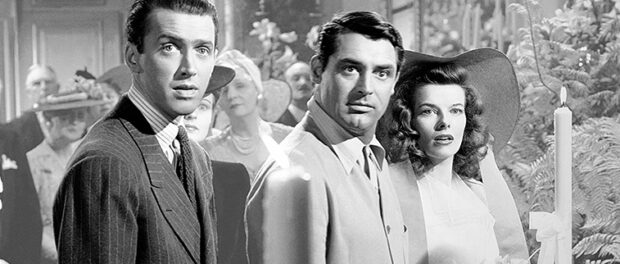The Philadelphia Story (1940)
[10]
The day before her second wedding, a priggish socialite (Katharine Hepburn) entangles with her ex-husband (Cary Grant) and a tabloid journalist (Jimmy Stewart), causing an identity crisis that threatens to derail the ceremony. Does she really want to marry a man who sees her as an infallible goddess? Or does she want someone who will let her put her hair down and love her for who she wants to be — warts and all?
With its trio of star talents, an actor’s director like George Cukor, and a script full of acerbic witicism, The Philadelphia Story is a classic among classics. Hepburn takes her character through a remarkable transformation — from touch and confident, to humbled and ashamed — effectively tearing her down and building her back up again. Stewart provides the working man’s perspective, critical and jealous of Hepburn until he begins to admire her vitality. And then there’s Grant, grounding the movie and propelling the plot, occasionally offering droll side remarks about his co-stars’ antics. These include getting drunk and causing the groom (John Howard) reason to suspect impropriety.
As I watched The Philadelphia Story for at least the fourth or fifth time, I was able to see past the star turns for the first time to appreciate Donald Ogden Stewart’s screenplay, based on the play by Philip Barry (Holiday). It gives Hepburn’s character not one, not two, but three romantic suitors. But her interactions with Stewart are the most remarkable. On the surface, they suggest the two are falling in love — and indeed, that’s what Stewart thinks. But in reality, Stewart is helping Hepburn fall in love with herself — her true self. Where most romantic comedies rely on love triangles or characters ‘completing each other’, The Philadelphia Story stands out because it’s first and foremost about self-love. Hepburn’s self-love in the film makes the rest of her problems fall easily into place. Maybe it’s a lesson that should appear in more movies.
With terrific supporting turns from Ruth Hussey as a photographer who secretly loves Jimmy Stewart’s character, and Virginia Weidler as Hepburn’s precocious little sister.
Academy Awards: Best Actor (James Stewart), Screenplay (Donald Ogden Stewart)
Oscar Nominations: Best Picture, Actress (Katharine Hepburn), Supporting Actress (Ruth Hussey), Director (George Cukor)


